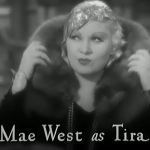 |
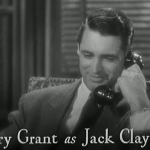 |
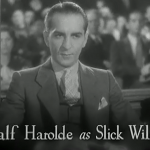 |
| Tira Mae West |
Jack Clayton Cary Grant |
Slick Wiley Ralf Harolde |
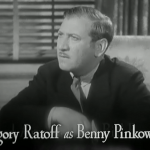 |
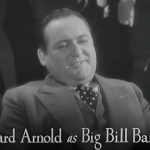 |
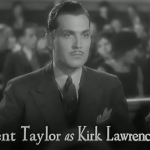 |
| Benny Pinkowitz Gregory Ratoff |
Big Bill Barton Edward Arnold |
Kirk Lawrence Kent Taylor |
| Released by Paramount Pictures | Directed By Wesley Ruggles |
||
Proof That It’s Pre-Code
- It’s a film about Tira, “The woman who discovered you didn’t need to have feet to be a dancer!”
- During her ‘dance’, a whole host of men visibly gape at her. “A penny for your thoughts,” she smirks.
- “Ah, you have a wonderful future. I see a man in your life!”
“What, only one?!” - “I see a change of position.”
“Sitting or reclining?” - The outfits in this movie are interesting to say the least, and provocative if I wanted to say just a little more.
- Tira has a trunk full of jewels with pictures of all the men she got them from.
- Several serial spouses make an appearance. One man is on his fifth marriage when he tries to seduce Tira,
- Suggest a man stand in front of her show and chomp on a big cigar.
- Thinking he’s killed someone, Wiley is clearly turned on.
- “It’s not the men in your life, it’s the life in your men.”
- At one point, Tira has to spell out her attorney’s name on the phone to a phone operator. This includes such risque jokes like “‘P’ as in ‘pansy’!”, “‘T’ as in ‘tomato!’!”, and “‘W’ as in ‘witch'” (and that last one she has to repeat twice because “[that] dame misunderstood me”.)
- There’s a really weird statue. You know how that is.
- “Why, she’s safer in that [lion’s] cage than she is in bed!”
“I don’t doubt it.” - A note from a lover reads: “To Tira- Who can tame more than lions.”
- “I was under the impression that you is a one man woman.”
“Yeah, one man at a time.” - Tira collects lovers and has a man for each sign of the zodiac.
- “Want me to swear?”
“Never mind, I can do that myself.” - “You were wonderful tonight.”
“I’m always wonderful at night.”
“But you were especially good tonight.”
“Well, when I’m good, I’m very good, but when I’m bad, I’m better.” - “I get better as I go along.”
- “What are you thinking about?”
“The same thing you are.” - And probably more, if I’m going to be completely honest.
I’m No Angel: When She’s Good, She’s Very Good
“Never forget: take all you can get for as little as you can give.”
Man, after writing out today’s ‘Proof That It’s Pre-Code’, I’m not sure I really need to add a review. But, since I’m a sucker for a challenge, here we go!
I’m No Angel is the second starring vehicle for Mae West. When her movie career started, she was already infamous for staging “Sex” on Broadway– it’s a name of a show, trust me– and she’d consequentially served jail time for obscenity and made headlines around the country. West’s personality, which I hope you’ve picked up on merely through cultural osmosis, is that of a voracious, voluptuous sexual being. In a time where most movies saw the young sexually adventurous and fairly svelte heroine taught the pleasures of chastity, I’m No Angel has middle-aged, well-endowed Mae West getting all the sex she can and, by the end of the picture, striking it rich and beating the system at its own game. And all with an adorable eye roll.
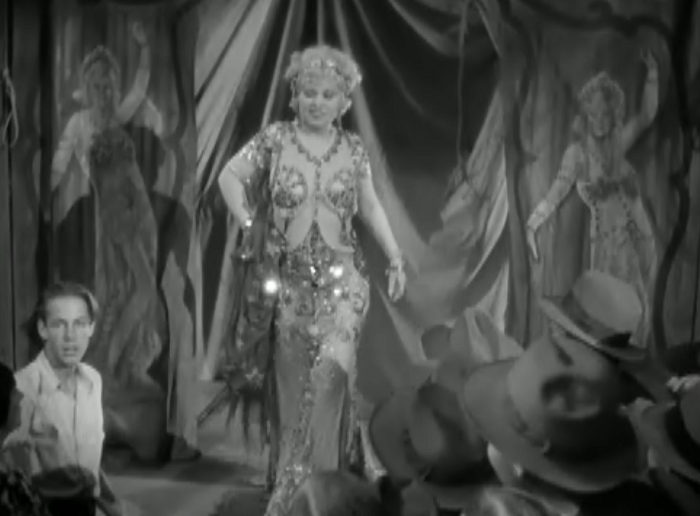
An outfit and hairstyle that says plenty.
We start the movie at the circus where West is Tira, a dancer who possesses “the only show on earth whose tickets are made from asbestos!” She wears a dingy costume with a ridiculous hairstyle and entertains the audience through sheer hip movements and chutzpah. (One nice touch: while the audience rushes the stage to ogle, the carny in charge of the lighting in the foreground adjusts the setup for her entrance and quickly goes back to reading his book.)
Offstage, Tira is more earthy; she indulges in her horoscope and helps a distressed circus performer by passing off some jade given to her by one of her many admirers. She has one unwelcome stalker named Slick Wiley (and what a name that is) who interrupts her with a disreputable businessman from Dallas. He knocks the date out in a fight, so Tira retreats to the sleazy circus manager Big Bill Barton. Barton offers to buy her out of trouble if she agrees to a new act– going from the girl who wiggles her hips to the one who sticks her head into the mouths of lions. With no other choice, Tira takes the offer.
We cut ahead a few months and Tira is the toast of New York. The carnival has gone from crummy to classy, and Tira no longer wears glorified frilly cheesecloth, instead moving up to a form fitting lion tamer’s costume. Her entrance has also increased in prestige, as she gets to ride an elephant into the big top, with all of the lack of subtlety you can imagine there. West makes good use of a whip and a pistol as she gets the lions to perform their tricks, climaxing with her gently caressing one lion and sticking her head into his gaping maw.
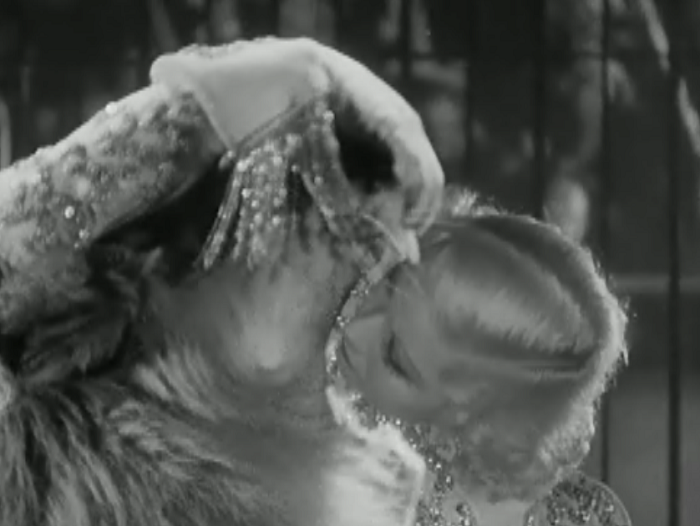
Not to ruin the bit, but looking at the screenshot, it looks pretty clear that West just stuck her head behind the mouth rather than sticking it in. Not that I can blame her for a simple bit of visual trickery.
This risky act and the big show being made of a sexy lion tamer has the blue bloods of New York perked up. Tira has soon collected a suitor for each sign of the zodiac, including a dapper Kirk Lawrence (with annoyed fiancee, Alicia, in tow). With Kirk paying far too much attention, his cousin Jack Clayton gets involved. But as soon as Jack enters Tira’s penthouse suite, he’s smitten and seduced.
What makes I’m No Angel so special (and so incendiary) is that it offers two things that other West features lack: a sense of humility and a bounty of subtext. (And on that latter point, I do mean more than innuendos.) The humility first, which may not be apparent to those who missed West’s other features. Tira here is a real woman with feelings and emotions, clearly possessing a sense of pride and independence. She’s innately human, with her faith in astrology and inability to shrug off ex-lovers visibly demonstrated to be flaws. … yeah, I know, this doesn’t sound revolutionary, but for a West film to portray her as anything less than Venus incarnate is sublime.
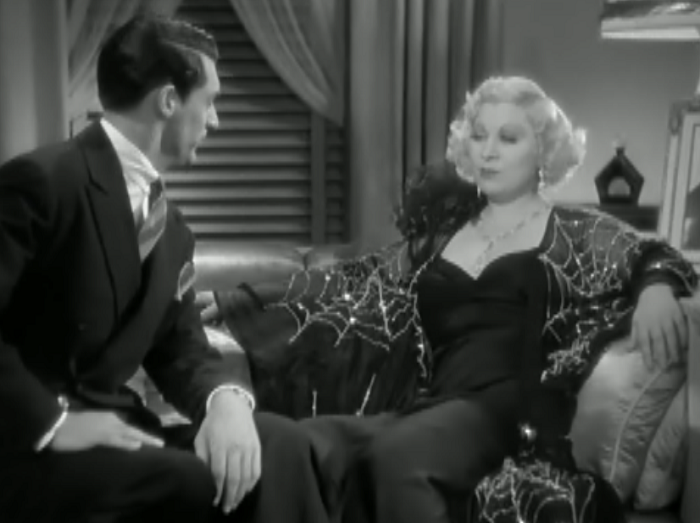
Nice outfit, Mae.
But the more interesting half is how the movie may be one of the most frank explorations of a woman’s sexual freedom that you’ll get out of the early 1930s. This isn’t just because we get a good sense of West and her love for carnal delights, but even a base reading of the movie shows that her character, while adhering to the standards of the ‘gold digger’ archetype of the early 30s, faces opponents that are in actuality three avatars of the problems all women faced in society at the time. Each of them presents a troubling manipulation of Tira, and a threat to her independence.
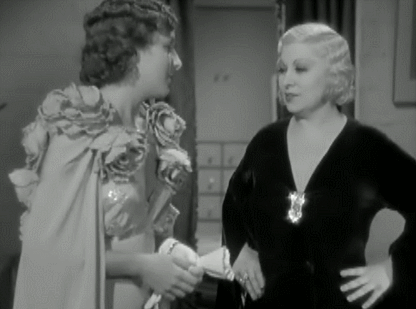 The first is Alicia. Sexual norms are shown to be enforced from above in the form of Lawrence’s stiff high society fiancee Alicia who is disrespectful and condescending to Tira every time they meet. She’s the only woman in the picture who doesn’t get along with Tira, who she deems below her and unworthy of the praise and admiration she receives. Mind you, as a lion tamer, Tira sure does a hell of a lot more than Alicia to earn her position, and while Alicia isn’t physically unattractive, she’s catty and arrogant. It’s no surprise her fiance would run from her as soon as he saw another woman so much smile, let alone do something that seems worthy of praise or interest. A sense of competitiveness is entombed within Alicia, as in the scene where she comes to ask Tira to stop running around with Lawrence, and Tira refuses simply because of the condescending way she is asked. If women are going to get anywhere in terms of equality, the film says, they must learn to respect one another.
The first is Alicia. Sexual norms are shown to be enforced from above in the form of Lawrence’s stiff high society fiancee Alicia who is disrespectful and condescending to Tira every time they meet. She’s the only woman in the picture who doesn’t get along with Tira, who she deems below her and unworthy of the praise and admiration she receives. Mind you, as a lion tamer, Tira sure does a hell of a lot more than Alicia to earn her position, and while Alicia isn’t physically unattractive, she’s catty and arrogant. It’s no surprise her fiance would run from her as soon as he saw another woman so much smile, let alone do something that seems worthy of praise or interest. A sense of competitiveness is entombed within Alicia, as in the scene where she comes to ask Tira to stop running around with Lawrence, and Tira refuses simply because of the condescending way she is asked. If women are going to get anywhere in terms of equality, the film says, they must learn to respect one another.
(This respect is also consequentially embodied in the relationship Tira has with her black maids, who also act as confidants. The maids themselves are just as sexually active as Tira (which no doubt spilled many mint juleps in a certain region of the country), but they lack the power or prestige that Tira has and understandably respect her for what she’s done for it. But the class or skin color don’t matter to Tira; these are her pals.)
(And before I get any comments pointing out the subservient nature and unflattering portrayal of the black maids’ speaking patterns, two things: 1) they’re her employees and 2) welcome to the unpleasant, messed up world of 1930s racial relations. Honestly, compared to some other portrayals, here even implying that these women have sexual feelings and are equivalent to Tira in everything but lucking into a higher class is still crazy radical.)
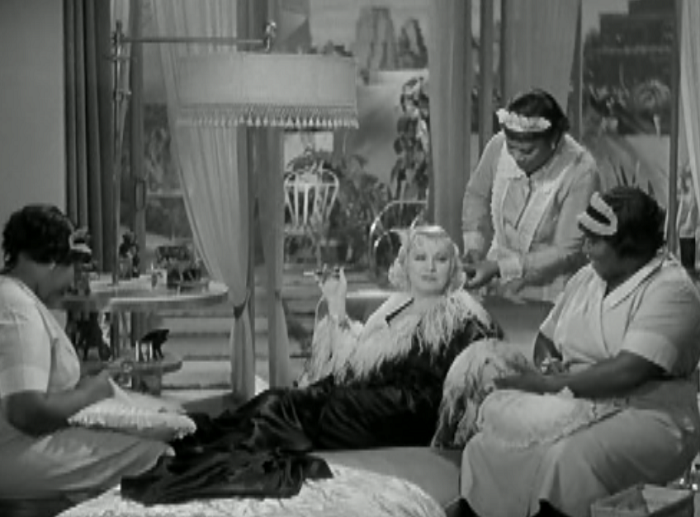
It’s like “Sex and the City”, only, you know, less Kim Cattrall. Which is the movie’s biggest flaw, really.
The second issue women face is exploitation. Big Bill Barton takes advantage of Tira at her lowest points and then, when she quits on him, he manipulates her to keep her in his stable. It’s extremely shady (and Barton notably suffers no consequences for his actions besides being assigned to the zodiac sign of ‘skunk’), but it’s fairly indicative of employer-employee relationships between men and women in 1933. They can push you around, they can wreck your life, and there’s nothing you can do about it.
Lastly, there’s good ol’ Slick Wiley. He manipulates her, plain and simple, abusing her emotional trust. In fact, it’s apparent throughout the movie that Wiley doesn’t care for Tira one bit. Though he says he loves her, he only loves her when she explicitly does what he wants her to. He’s also deeply, viciously angry about her sexual proclivities. Wiley is the major catalyst that forces Tira into both of her lowest moments in the film simply because he completely dehumanizes her.
Women who belittle each other out of jealousy, bosses who exploit people, and men who remove agency from women for their own selfish reasons are all wholly representative of the enemies faced feminism faced throughout the 20th century. West’s solution, to use a modern colloquialism (and a touch of profanity), was to maintain a healthy self respect and simply, “fuck the haters.”
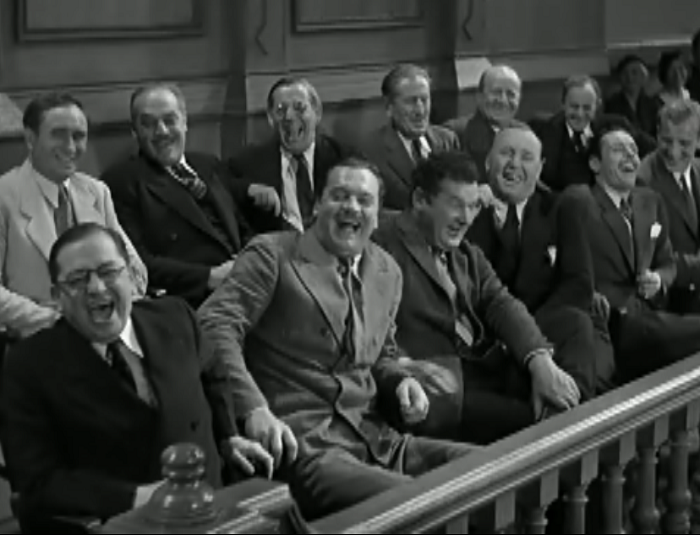
The jury loves that. “You go girl!” they cry.
Spoilers.
Tira isn’t that discriminating, though, at least until she and Clayton begin to get on royally. But, in fear of losing his star attraction to a marriage, Barton arranges it so that Wiley appears in Tira’s apartment to make Jack think the two are still engaged in an affair. He breaks it off, and, incensed, Tira files suit for a breach of promise. The film’s climax is Tira facing down a courtroom of jilted lovers and the cruel Wiley by defending herself with common sense, honesty, and brazen confidence. The judge and jury love her for it (as they’re the stand-ins for the audience at home), and, seeing the woman he once loved defend herself so concisely, Clayton chooses to settle.
I’m No Angel heavily, heavily links money to eroticism. While it certainly shows that men are the same, no matter where they are on the social ladder, it also makes good on pointing out what a bargain it is if you can find your man and keep him. Tira is a lower class girl who takes a risk and it pays off. If, in the film’s ending, it appears that she finally picks sex over money, it’s really a diversionary tactic. Rejecting Clayton’s offer of a lump sum check, she chooses to marry him instead and his Wall Street millions. She’s in the money indeed.
There are a few musical numbers, and, while West’s voice isn’t exactly refined, they manage to get the point across. Like in One Hour With You, singing is used a shorthand for sexual excitement that couldn’t be shown on screen at the time. The film’s final shot, where West is singing a reprise of the title track, noticeably cuts her off. This happens at a moment where Tira is on her back and Clayton slowly coming closer to her on the couch– I think it’s safe to say she didn’t stop singing because of a burp.
End spoilers.
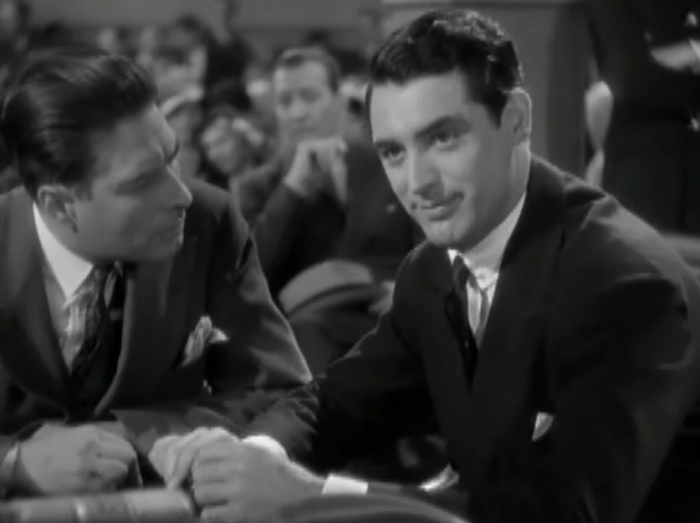
How can you resist that? Er, Mae West, I mean.
I’m No Angel does suffer from some of the problems that would effect West’s other films– such as She Done Him Wrong and Belle of the Nineties— in that the center attraction is Mae West, first and foremost. I’ve heard this called narcissism on a couple of sites (possibly including my own), but, weirdly, where it’s painfully obvious in her other vehicles of the era, the way West is presented in I’m No Angel easily trumps her other movies. The humor can be hit or miss– West is, as usual, the only one actually cracking jokes– but I found the plot on this one compelling enough to overlook the sometimes paucity of jokes for once.
Censors were (understandably) incensed when Paramount put West under contract and even more frantic when her self-penned plays were reworked into starring vehicles. And while Will Hays and the rest of the censors could attack them, they couldn’t stop Paramount, and, when finally released I’m No Angel was the highest grossing movie of 1933. Often cited as one of the pillars of forcing the censors to enforce mandatory standards on Hollywood’s output, I’m No Angel is a huge deal for anyone who wants to understand and celebrate what the pre-Code era meant– and what American audiences subsequently lost. As a big fat thesis statement for early 20th century feminism and sexual freedom, I’m No Angel is a masterpiece.
Trivia & Links
- Mondo 70 has some great words about this one:
Any woman playing the lawyer’s part on screen was still a rarity at this time, and Mae West as a mock-lawyer must have been dynamite for 1933 audiences. She lives up to the moment, brilliantly demolishing Pichel’s case man by man, vindicating herself without denying or renouncing anything, including the gifts she accepted — but did not solicit, she insists — from all the men. It may be her greatest scene on film because it requires her to really engage her interlocutors — she often seemed oddly aloof, as if walled up behind her own one-liners, in She Done Him Wrong — but in a confrontational setting that allows her to assert her preferred dominance.
- AMC Filmsite has the full rundown on this one, with quotes and a full plot description.
- Vienna’s Classic Hollywood looks at one of the film’s most famous lines — “Beulah, peel me a grape.”
- Film Fraction talks about Mae West’s costuming done by Travis Banton and how it helps to explain her character.
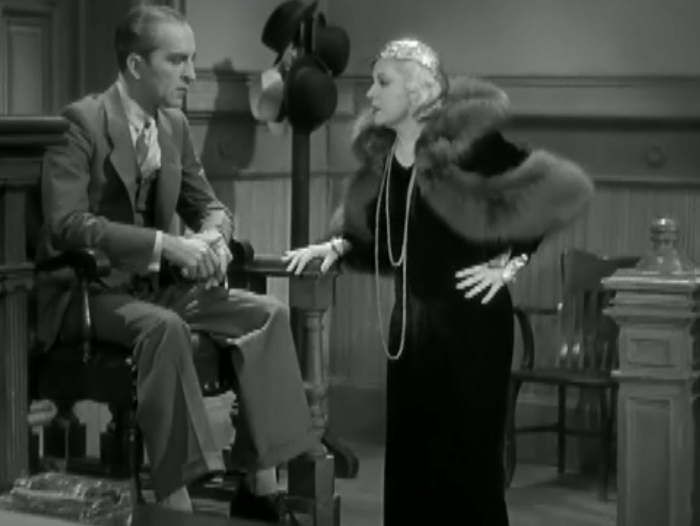
It’s true, that costume does say a lot…
- CaryGrant.net has a host of reviews, both contemporary and older.
- The invaluable Movie Diva explains the connection between the movie, Mae West, homosexuals, and African-Americans:
Mae blurs the line between biological and cultural femininity. She makes a spectacle of her lustful middle-aged desires in a world that values youth, where every woman is alluring and every man can be had. Her sultry persona was adapted from a famous female impersonator in vaudeville named Bert Savoy, whose catchphrase, “You MUST come over,” foreshadowed Mae’s “Come up and see me.” Mae had a lot of gay male friends and wrote two Broadway plays in the 20s dealing with their underground world,” The Drag” which featured a 3rd act with real drag queens in a staged wild party, and “Pleasure Man.” There’s coded language in her films, too. When she says, “I like sophisticated men to take me out,” the meaning is: “apparently straight, but open to suggestion.” Parker Tyler, a pioneer of cinema’s sexual subtexts called her “the Mother Superior of the Faggots”. When the Production Code banned “sex perversion” they meant no gay characters, no gay subtext.
In the 1920s, she saw the shimmy in an “all-Negro” dive in Chicago, and introduced it into her show. She lifted her vocal rhythms and inflections from the black side of show business, as well. As a heroine, she seems more like the powerful matriarchs of black culture, and the tone of her speech mingles with her maids in a shared rebellion against the ruling class, in this case, men. In “I’m No Angel” kissing Cary Grant is less important than talking about kissing Cary Grant with her “home team”. Positive images of African Americans were something else that threatened the status quo. In the early 30s, there were occasional instances of intelligent black characters; for example Paul Robeson in “The Emperor Jones” and in “Arrowsmith” a black doctor acts almost as the conscience for Ronald Colman’s troubled physician. Once the Code was enforced, so was Jim Crow.
- The film’s trailer:
Awards, Accolades & Availability
Comment below or join our email subscription list on the sidebar! |
||
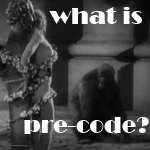 |
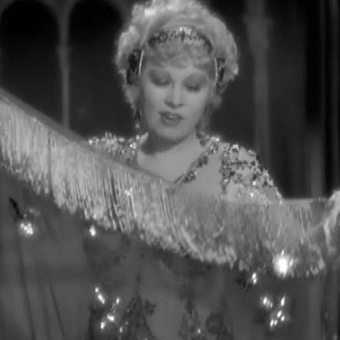 |
 |
 |
 |
|



